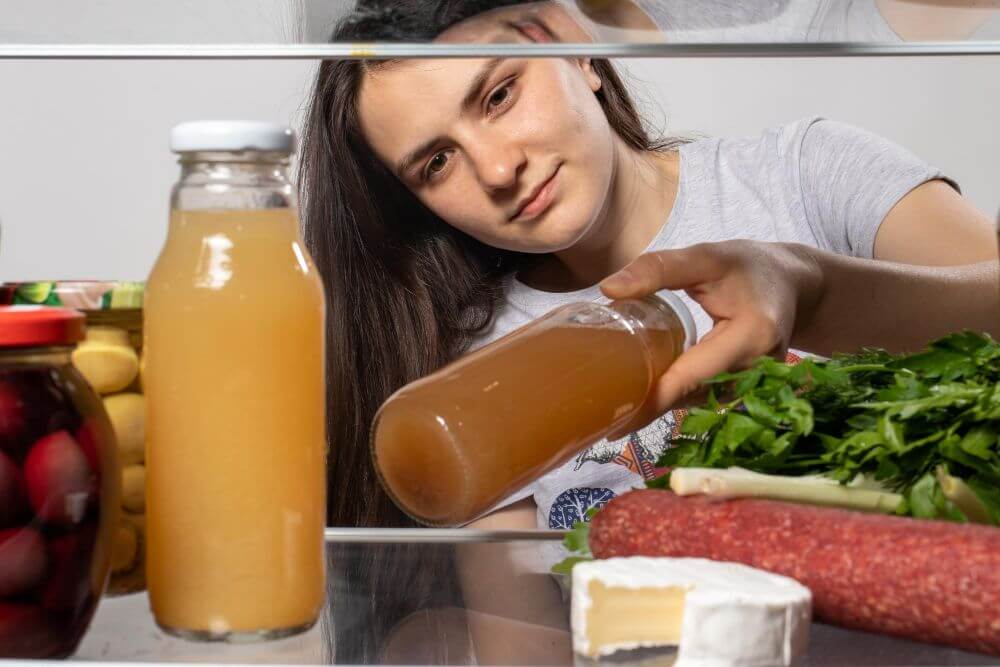According to research by statista.com, the average American enjoyed an impressive 20.5 pounds of fresh onions in 2021! Who knew we had such a taste for this tasty vegetable? But even if you decide to stock up on onions or make your onion juice, how long can it last without refrigeration?

Onion juice is a popular ingredient in many dishes and has been used for its medicinal properties for centuries. It is a versatile ingredient that can be used in many ways, from flavoring dishes to treating various health conditions. However, many are unsure how long onion juice can be kept without refrigeration. In this article, we will explore the shelf life of onion juice and the factors that affect its longevity.
Shelf Life of Onion Juice
The shelf life of onion juice varies depending on several factors. One of the most important factors is whether the juice is fresh or processed. Fresh onion juice typically has a shorter shelf life than processed juice.
Fresh onion juice is typically made by grinding or blending fresh onions and then straining the resulting liquid. Fresh onion juice is highly perishable and should be consumed immediately after preparation. If it is not consumed right away, it should be refrigerated and consumed within a day or two. This is because fresh onion juice is susceptible to bacterial growth, and leaving it out at room temperature can quickly lead to spoilage.
Read a Similar Post: Does Cheese Bread Need To Be Refrigerated?
Processed onion juice, on the other hand, typically has a longer shelf life than fresh juice. Processed onion juice is typically made by cooking the onions before blending them. This cooking process helps to kill any bacteria or other microorganisms that may be present in the onions, which extends the shelf life of the juice. Processed onion juice can typically be stored at room temperature for several weeks or even months, depending on the specific processing method used.

Factors Affecting the Shelf Life of Onion Juice
Several factors can affect the shelf life of onion juice. These include:
Processing method
As mentioned above, the processing method used to make the onion juice can significantly impact its shelf life. Fresh onion juice has a shorter shelf life than processed juice because it is more susceptible to bacterial growth.
Temperature
Temperature is another crucial factor affecting onion juice’s shelf life. Fresh onion juice should be refrigerated immediately after preparation to slow down bacterial growth. Processed onion juice can typically be stored at room temperature, but higher temperatures can cause it to spoil more quickly.
Exposure to light
Exposure to light can also affect the shelf life of onion juice. Light can break down the nutrients in the juice and cause it to spoil more quickly. To extend the shelf life of onion juice, storing it in a dark, cool place is best.
pH level
The pH level of onion juice can also affect its shelf life. Onion juice has a naturally low pH, which makes it inhospitable to many types of bacteria. However, if the pH level is too high, it can create an environment conducive to bacterial growth, which can cause the juice to spoil more quickly.
Microbial contamination
Microbial contamination can also affect the shelf life of onion juice. Fresh onion juice is more susceptible to contamination than processed juice because it has not been cooked to kill any bacteria or other microorganisms that may be present. To avoid microbial contamination, using fresh, clean onions and following proper food safety practices when preparing the juice is best.

How to Store Onion Juice
To extend the shelf life of onion juice, it is important to store it properly. Fresh onion juice should be refrigerated immediately after preparation and consumed within a day or two. If you want to keep fresh onion juice for longer, you can freeze it. To freeze onion juice, pour it into an ice cube tray and freeze until solid. Once frozen, transfer the onion juice cubes to a freezer bag and store them in the freezer for up to three months.
Processed onion juice can typically be stored at room temperature, but storing it in a cool, dark place to extend its shelf life is best. If you are unsure about the best way to store your onion juice, use an airtight container or jar to keep the juice fresh for longer. Ensure the container is clean and dry before pouring the juice into it. Removing as much air as possible from the container before sealing is important to minimize the risk of bacterial growth.
If you are using a jar, make sure that the lid is tightly sealed to prevent air from entering the jar. You can also cover the top of the jar with plastic wrap or aluminum foil before sealing the lid for added protection.
If you plan on storing your onion juice for an extended period, consider using a vacuum sealer to remove all the air from the container. This will help minimize the risk of bacterial growth and keep the juice fresh for longer.
When storing onion juice, it is essential to label the container with the date of preparation. This will help you track how long the juice has been stored and when it needs to be consumed.

Final Thoughts: How Long Can I Keep Onion Juice Without Refrigeration?
In conclusion, the shelf life of onion juice depends on several factors, including the processing method used, temperature, exposure to light, pH level, and microbial contamination. Fresh onion juice is highly perishable and should be consumed immediately after preparation or refrigerated and consumed within a day or two. Processed onion juice can typically be stored at room temperature for several weeks or months, depending on the specific processing method used.
To extend the shelf life of onion juice, it is crucial to store it properly. Fresh onion juice should be refrigerated or frozen, and processed onion juice should be stored in an airtight container in a cool, dark place. By following proper storage techniques and food safety practices, you can enjoy the many benefits of onion juice for longer.




